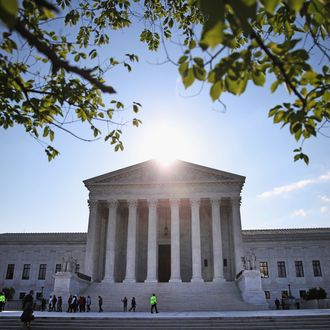
The much-traveled case wherein Abigail Fisher (who subsequently graduated from LSU four years ago) sued to end consideration of race in admissions decisions by the University of Texas returned to the Supreme Court for a second time this term. In Fisher I, the Court (in an opinion written by Justice Anthony Kennedy) by a 7–1 margin reversed district- and circuit-court judgments that the university’s consideration of race in admissions was acceptably marginal, and remanded the case for a more detailed questioning of UT’s rationale and methods. It sure looked like Kennedy and a Court majority was going to be extremely hard to satisfy.
But today, in Fisher II, Kennedy wrote the opinion for a 4–3 majority (Justice Kagan participated in an early phase of the case as solicitor general, and thus recused herself), deciding UT had a legitimate interest in student diversity and had exhausted other methods of achieving it before resorting to the marginal use of race-conscious remedies.
In a dissent, Justice Alito expressed the surprise of many other observers at how Kennedy came out in Fisher II: “Something strange has happened since our prior decision in this case.” Alito articulates the conservative view that it’s almost impossible for race-conscious remedies in this area to survive the strict-scrutiny standard set out by the Court in earlier cases (including Fisher I), and spends many words disputing Kennedy’s conclusion that UT met the standard or did anything other than repeat vague tributes to the value of diversity. In a separate dissent, Justice Thomas repeated his long-standing contention that any use of race in college admissions violates the Equal Protection Clause.
While this decision was a victory for the beleaguered cause of affirmative action in college admissions, it may not be particularly durable. Kennedy’s opinion insists that UT (and other schools) must continue to monitor closely the use of race-conscious policies in admissions to keep them as minimal as possible and continue to apply other methods for achieving diversity. In other words, it will remain a case-by-case matter, even with respect to this one school’s much-litigated program. And while a 4–3 decision has the same value as precedent as any other SCOTUS decision, it could more easily be overturned if the Court’s composition changes. Had Justice Scalia still lived, of course, it’s likely Fisher II would have yielded a 4–4 deadlock like other cases this term (e.g., U.S. v. Texas, the immigration case also decided — or undecided — today).
So the cause of affirmative action in college admissions lives on, but will probably continue to receive constitutional scrutiny for the foreseeable future — say, until Abigail Fisher’s children are ready to apply to college.






























